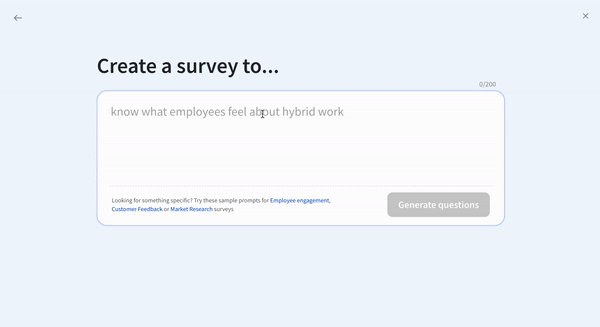Creating a Survey? Here are 15 Survey Questions You Should Never Ask

Karun Krishnadas
Last Updated: 4 October 2024
10 min read

Are you one of those people who mindlessly breeze through a feedback form and get it done in the blink of an eye? I can’t speak for everyone, but I sure am. In fact, most people I’ve met aren’t too keen to take surveys.
However, the catch here is that this feedback we provide is looked upon by the company/organization and they use it to improve their service. Hence, it is indispensable for a company to take surveys to find out ways the brand can evolve and deliver the best.
While we can agree that surveys are necessary, a lot of them are ridden with bad questions that are repetitive, intrusive, and annoying. So, if you’re planning on creating a survey, it is important to ask the right questions at the right time.
Top 15 Survey Questions You Must Never Ask
To help you with that, we’ve compiled this blog with survey questions you should never ask your respondents. Make sure to read till the end to avoid this survey mistakes like the plague. 😉
Bad Survey Question #1: The Contradictory Question
Contradictory questions are those questions that would have only a confirmatory answer or a negative answer. In other words, these are just yes/no questions without intending to be. But these questions do not shed light on the ‘why’ part.
Such questions are often close-ended, and the company will not get a clear idea of why the user opted for that answer. Such questions that pull respondents towards a single answer disrupt the objective of the survey.
To resolve this, you can follow up with a question digging deeper or go with a multiple choice question type.
Don’t: “Would you prefer product A?”
- Yes
- No
Do: “Which of the following products do you prefer?”
- C
- B
- A
Bad Survey Question#2: The Twofold Question
Quite similar to the shotgun that fires two rounds at a time, this question type combines two questions into one. While that might sound like hitting two birds with a single rock, you end up confusing the respondent and may not even get the answers you were looking for.
The golden rule when drafting survey questions is to come up with a single and clear question so that the user can give a clear answer. When you double up the question, it is sure to lead to ambiguity.
Hence, it is always advisable to split up the twofold question so you can find the response you require from the respondent. It is always better to focus on one question at a time so that the respondent gives genuine feedback.
Don’t: “Will this cookbook be useful for beginners and professionals?”
Do: “Will this cookbook be useful for beginners?” and “Will this cookbook be useful for professionals?”
Do you want to ask better questions? Lucky for you, SurveySparrow comes with hundreds of pre-loaded templates that help you ask the right questions and, even better, customize them to perfection. Give our best features a whirl today by signing up for FREE.
14-day free trial • Cancel Anytime • No Credit Card Required • No Strings Attached
Bad Survey Question #3: The Manipulating Question
I’ve seen my share of survey questions that manipulate me to go for a particular answer. The problem with these questions is that the manipulation prevents your respondent from giving you any feedback. It can trigger an instant suspicion and dislike towards your brand.
And the survey creators might get what they want, but definitely not what they need!
Don’t: “Was the dish too spicy?”
Do: “How would you describe the flavor of the dish?”
Bad Survey Question #4: The Rigged Question
A variation of the manipulating questions, rigged questions make an assumption about the respondent and expect them to abide by that.
Such questions force the respondents to give an answer, and that hides the real opinion they may have had. The rigged questions could reduce the accuracy of the respondents’ answers, which, in turn, forces them to answer less accurately.

Don’t: “Where would you go to buy superhero costumes for Halloween?”
Do: Ask a preliminary question to check whether the user dresses up for Halloween and if he is into superheroes before asking him about the store he frequents.
Bad Survey Question #5: The Complicated Question
Your average survey respondent doesn’t have to be as well-versed in the topic as you. Moreover, they are doing you a favor by offering their feedback. You wouldn’t want to risk offending them or stuffing them with jargon that will only complicate things further.
When people go through survey questions that they can’t understand, they tend to give sloppy answers. Each time you prepare a survey, make sure that your average user can readily understand what is required of them without having to refer to Thesaurus so they can provide an accurate answer. Remember to keep it real and simple, always.
Don’t: “How well did the food match up to your palate?”
Do: “How tasty was the food?”
Bad Survey Question #6: The Irrelevant Question
A couple of weeks ago, I went to this new restaurant in town, famous for its Chinese cuisine. The meal was splendid, but I was taken aback by a question in their feedback form.
There was a question asking me to state my occupation and I couldn’t figure out how was it relevant to how much I liked the food. I’m sure the Dragon Chicken would taste just the same to me were I a lawyer, or an accountant.

The shorter the survey, the better your chances of getting more responses. Each of your questions has to be valid and insightful. It’s always recommended to stick to relevant questions that make a sensible survey.
Bad Survey Question #7: The Nosy Question
While this might sound similar to the irrelevant question types, the spying question can do more damage. These questions tend to pry and require the respondent to divulge information that they would rather not tell.
Unless you are their auditor, stay away from questions that require your survey respondent to disclose their annual income. Respect their privacy and never demand sensitive information. Unless you are the auditor, of course!
Bad Survey Question #8: The Puzzling Question
This one is rather obvious, but it’s amazing how many surveys get this wrong. Do not, at any cost, confuse your survey taker.
Multiple-choice questions that are not mutually exclusive to one another make me want to pull my hair out. Not the ideal response you were looking for, am sure.
Don’t: “Choose the range of marks you scored on the exam?”
- 0-10
- 10-20
- 20-30
- 30-40
- 40-50
Do: “Choose the range of marks you scored on the exam?”
- 0-10
- 11-20
- 21-30
- 31-40
- 41-50
Bad Survey Question #9: The Spying Question
The spying questions put the respondents in a fix where they cannot afford to answer you truthfully. For instance, when your employee surveys require you to give a character analysis of your manager, you are left with few choices.
In most cases, people don’t trust the survey and would give a glowing report, which could be far from the truth. Which, if you didn’t already realize, defeats the whole purpose.
Don’t: “Was Mark able to perform well?”
Do: “On a scale of 1 to 10, how effective is your Direct Manager in aligning your assignments with the organization’s goals?”
Bad Survey Question #10: The ‘Uh?’ Question
Some questions contain double negatives which can be incredibly perplexing. Double negatives are bad news, and they can ruin an otherwise thoughtful survey.
Unlike mathematics, it’s highly unlikely that you elicit a positive response with double negatives in a survey. It causes uncertainty and makes it difficult for the respondent to even comprehend the question.
Don’t: “Which of these pictures is not unattractive?”
Do: “Which among these pictures did you find attractive?”
Bad Survey Question #11: The ‘Know-it-all’ Question
During an online survey, making assumptions within the question is not a good practice as the respondent may be oblivious to what you are talking about. Not a good way to go about surveys, we can all agree.
Don’t: “How do you like the new features of the Audi TT?”
Do: Mention the new features of the Audi TT and ask how the respondent feels about each.
Bad Survey Question #12: The Weird Question
Weird questions are those questions that qualify as pointless, dumb, irrelevant, and simply strange. Weird questions make you look unprofessional and incompetent.
The rule of thumb should be to stick to the objective of the survey so that you don’t deviate from its purpose.
Don’t: “Would you rather know when you will die or how you will die?”
Do: Ask relevant questions that will give you the insights that you actually need.
Bad Survey Question #13: The Leading Question
Leading questions are those that guide the respondent towards a particular answer by the way they are phrased. Such questions influence the way respondents think and can greatly skew the results of the survey. Instead of getting genuine feedback, you end up getting answers that were subtly (or not-so-subtly) suggested by the question itself. Leading questions can introduce bias, and the data you collect may not reflect the true opinions or feelings of the respondents.
Don’t: “Don’t you agree that our product is the best on the market?”
Do: “How would you rate our product compared to others on the market?”
Bad Survey Question #14: The Hypothetical Question
These questions ask respondents to imagine a situation or condition that isn’t real or hasn’t happened. While sometimes these can be useful, they often result in speculative answers that may not be actionable.
Don’t: “If we were to introduce a new flavor, how likely would you buy it?”
Do: “Which of these potential new flavors would you be most interested in?”
Bad Survey Question #15: The Implied Consensus Question
This type of question assumes there’s a general consensus or common opinion about a topic, which might not be the case.
Don’t: “Why do you think everyone loves our new product?”
(Assumes everyone loves the product.)
Do: “How do you feel about our new product?”
How to Filter Out Bad Survey Questions with SurveySparrow
We've talked about our awesome template library. But did you know that we have an AI survey maker too?

Just enter a prompt—boom! You will get the perfect survey questions for your goal in minutes. Plus, we've got customizable themes, video backgrounds, auto-generated reports, and lots more.
Want to give these features a try? Create a free account below.
14-day free trial • Cancel Anytime • No Credit Card Required • No Strings Attached
Wrapping Up
Great surveys are all about great questions. Crafting fine questions always gives you accurate results to look upon. When in doubt, you could always look up SurveySparrow’s expert-crafted survey templates and get started in a jiffy.
Remember, clearer insights equip you to power up your VoC program, make informed decisions, and propel your business forward.
Good luck!

Karun Krishnadas
A fun loving soul, enjoys the little things life has to offer
Guest Blogger at SurveySparrow

Turn every feedback into a growth opportunity
14-day free trial • Cancel Anytime • No Credit Card Required • Need a Demo?




